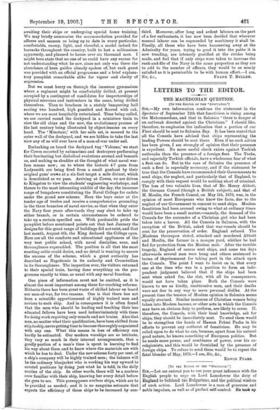LETTERS TO THE EDITOR.
THE MACEDONIAN QUESTION.
[TO THE EDITOR OP THE "SPECTATOR."]
Sin,—My own information confirms the statement in the Spectator of September 12th that fanaticism is rising among the Mahommedans, and that in Salonica "there is danger of an outbreak directed against the Christians." I should like, therefore, to emphasise the indication that a portion of our Fleet should be sent to Salonica Bay. It has been stated that all the Consuls have advised that ships representing the leading Powers should be sent there. Even if no such advice has been given, I am strongly of opinion that their presence is expedient. No more useful check exists against Turkish outbreaks than the presence of a foreign fleet. The Turks, and especially Turkish officials, have a wholesome fear of what a fleet can do. But in the case of Salonica the presence of such a fleet is especially necessary, and if the statement be true that the Consuls have recommended their Governments to send ships, the neglect, and particularly that of England, to comply with their request would be nothing short of criminal. The loss of two valuable lives, that of Mr. Henry Abbott, the German Consul (though a British subject), and that of M. Moulin, the French Consul, on May 5tb, 1876, was, in the opinion of most Europeans who knew the facts, due to the neglect of our Government to consent to send ships. Moslem fanaticism had been aroused owing to what at ordinary times would have been a small matter,—namely, the demand of the Consuls for the surrender of a Christian girl who had been taken into a harem. All the Consuls in Salonica, with the exception of the British, asked that war-vessels should be sent for the preservation of order. England refused. The
• Moslems thereupon rioted, attacked and murdered Abbott and Moulin, the former in a mosque yard, whither he bad fled for protection from the Moslem mob. ' After the terrible tragedy, England of course sent ships, and some ten days afterwards several men were hung and others sentenced to terms of illaprisonment for taking part in the attack upon the Consuls. The point I want to insist on is, that every one at the time who was in a position to form an inde- pendent judgment believed that if the ships had been sent when asked for, the riot., with all its consequences, would not have taken place. Both the Consuls were known to me as kindly, unobtrusive men, and their deaths were not due in any way to mere personal dislike. At the present time the tension of Moslem opinion in Salonica seems equally strained. Similar instances of Christian women being taken into Moslem harems, or other acts in which the Consuls may have an obvious duty to perform, are likely to occur. If, therefore, the Consuls, with their local knowledge, ask for ships, they should be immediately sent. To send them would be to strengthen the hands of Hassan Fehmi Pasha in his efforts to prevent any outburst of fanaticism. He may be relied upon to do what he can, because, apart from his natural good nature, he knows something of European politics. But he needs more power, and semblance of power, over his co- religionists, and this would be furnished by the presence of foreign ships. To refuse to send them would be to repeat the fatal blunder of May, 1876.—I am, Sir, &c.,
EDWIN PEARS.






































 Previous page
Previous page